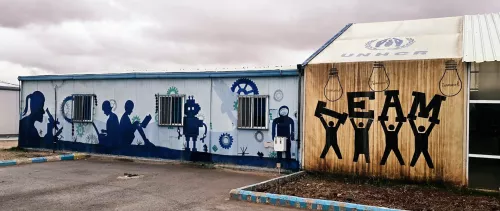
Technology is reshaping every aspect of people’s lives, and the humanitarian sector is no exception.
By the Treasury and Cash Service at UNHCR, the UN Refugee Agency
The UN Financial Gateway leverages digital financial technologies to enhance the delivery of humanitarian aid and promote financial inclusion.
Launched by the UN Refugee Agency, UNHCR, in 2022, the initiative aims to increase efficiencies in aid delivery while improving global access to financial services and markets for the most vulnerable, including for unbanked and underserved populations.
The objective is agile and efficient aid delivery directly to those most in need – anywhere, anytime, on any device.
Towards more efficient aid delivery
With over 311 million people in need of humanitarian aid worldwide, and with forced displacement numbers at a record high of 120 million people, United Nations organizations face the challenge of working with a fragmented financial and banking system to deliver aid.
UNHCR alone manages a yearly volume of over 2 million payment transactions and handles transfers of USD 6 billion to partner organizations, vendors and beneficiaries in support of its operations.
So far, making these payments has involved using multiple layers of technologies and connectivity systems, as well as processes that vary among UN organizations.
The resulting inconsistencies and misalignments heighten costs for humanitarians and involve too many intermediaries, impeding direct aid delivery to those in need.
The UN Financial Gateway – powered by UNHCR’s Digital Hub of Treasury Solutions and supported by the government of Switzerland – aims to standardize and harmonize the infrastructure and processes that the UN system uses for monetary value transfers and financial transactions.
Harnessing such collaborative opportunities across UN agencies and their humanitarian partners would enable potential efficiency gains of up to USD 60 million per year for UNHCR alone.
In addition, the Gateway seeks to leverage digital financial technologies to allow for aid delivery in a more agile, efficient, traceable, and secure manner.
The vision is to achieve real-time delivery of aid assistance with the minimum overhead costs, while promoting financial and economic inclusion.
Enabling the financial inclusion of the most vulnerable
Financial inclusion remains one of the main challenges to the scalability of digital financial solutions in humanitarian settings. Three-quarters of refugees are found in low and middle-income countries, and millions live in remote rural areas where digital and financial infrastructure can be poor or non-existent.
The UN Financial Gateway is already helping to implement innovative solutions for delivering financial assistance, such as digital wallets using blockchain technology.
Such solutions make cash disbursements easily accessible to recipients without bank accounts, or to refugees who lack identity documents.
Financial inclusion, in turn, helps refugees sustain their livelihoods, supports their inclusion in national services such as healthcare and education, fosters their digital inclusion, and allows them to contribute to the economies of their host countries.
However, reaching the people most at risk of exclusion requires continued investments in global connectivity, digital infrastructure, and financial literacy. UNHCR continues working with partners in those areas, including through the Connectivity for Refugees initiative, founded by UNHCR, ITU, GSMA and the Government of Luxembourg.
For the UN Financial Gateway to achieve its full potential, increased collaboration between governments, regulators, businesses, policymakers, and the private sector is required.
Traditional financial institutions, the decentralized financial movement, and next-generation financial technologies all have a role to play in solving this global challenge for access to services to all.
The UN Financial Gateway and UNHCR’s Digital Hub of Treasury Solutions (DHoTS) will be featured at SDG Digital in New York on 20-21 September.


